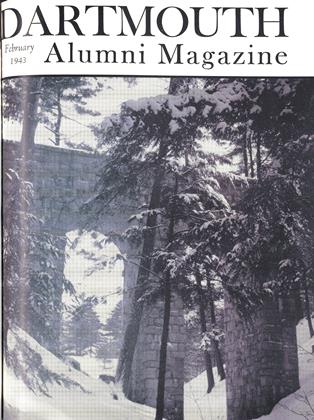Our mental dietitians will probably agree among themselves as seldom as the physical dietitians do when it comes to establishing a regimen for war-time college students; and it is certain that whatever is decided upon will be criticized because no one relishes the deprivations which every protracted war enforces. No one likes to be told that his consumption of sugar, oil, motor fuel or any other commodity which it has been customary to use without restraint, must be curtailed because of pressing necessity. Nonetheless it has to be done, and where the necessity is clear compliance is generally ready enough despite the grumbling. The one great difficulty is that of convincing the victim that there is a genuine need for him to cut down his ration of beef, or whatever it is that irks him most to give up.
In the case of the mental dietary prescribed for college students in time of war the principal objection is sure to come from the devotees of cultural subjects who resent the momentary eclipse of what are usually called the "humanities" by the sudden exaltation of what are alleged to be more "practical" courses of study—resentment sure to be intensified by the dread that ground once surrendered by the humanities in war-time will not be regained when peace returns. The clamor for more and more exaltation of "practical" courses at the expense of cultural ones is by no means new, but (like so many other current reforms) it gains in intensity because of war enthusiasms and makes more headway because it is so plausible to insist that an assistance of our war effort is involved. Many dubious claims shelter under the panoply of Mars, and the devotee of the classics is highly suspicious that this drive for their exclusion from the war-time college course may be one of them. Such is also the feeling of one dissatisfied with his allowance under a ration card. What is needed is conviction that the excuse urged on behalf of the curtailment is not a specious or illusory one.
Once allowing that it is a real need which compels the liberal arts colleges to cut the study of cultural subjects to a minimum, it remains desirable to insist that this curtailment shall be a war measure only, and not a permanent alteration of the traditional policy of colleges where the socalled "liberal arts" have always been held in honor. "Feed me with food convenient for me" is a sensible prayer. There is sure to be resentment of the imputation that cultural subjects are devoid of essential vitamines, whereof the "practical" studies possess a monopoly. Liberal arts may, and probably must, suffer temporary eclipse—but it is in order to insist that the eclipse be not permanent, else liberal education will become a memory. To that extent we believe that those who rebel against the emergency abandonment of the cultural ideal may set their fears at rest. The war will not last forever; and when it ends there will revive the necessity to cater to the needs of peace.
 View Full Issue
View Full Issue
More From This Issue
-
 Article
ArticleSulzberger Addresses 1943
February 1943 -
 Article
Article'Round the Girdled Earth
February 1943 By Herbert F. West '22. -
 Article
ArticleColleges Will be Used for Military Training
February 1943 By LLOYD K. NEIDLINGER '23 -
 Article
ArticleGovernment War Work
February 1943 -
 Class Notes
Class Notes1939
February 1943 By RICHARD S. JACKSON -
 Class Notes
Class Notes1929
February 1943 By F. WILLIAM ANDRES
P. S. M.
-
 Article
ArticleThe Overmastering Need
February 1943 By P. S. M. -
 Article
ArticleMemorializing Wheelock
December 1943 By P. S. M. -
 Article
ArticleMilitary Training
November 1944 By P. S. M. -
 Article
ArticleWhat Are the Liberal Arts?
November 1944 By P. S. M. -
 Article
ArticleWe, The People
August 1945 By P. S. M. -
 Article
ArticleEmbattled Independents
February 1946 By P. S. M.
Article
-
 Article
ArticleMAGAZINE OF DESTRUCTIVE CRITICISM STIRS UP SQUALL
May, 1923 -
 Article
ArticleCorporation Support
November 1957 -
 Article
ArticleFederal Grant Will Aid Follow-up Study of ABC
JANUARY 1966 -
 Article
ArticleFaculty news Interpretations
DECEMBER • 1985 -
 Article
ArticleAROUND THE GREEN
Mar/Apr 2005 -
 Article
ArticleBig Green Teams
June 1975 By JACK DEGANGE

